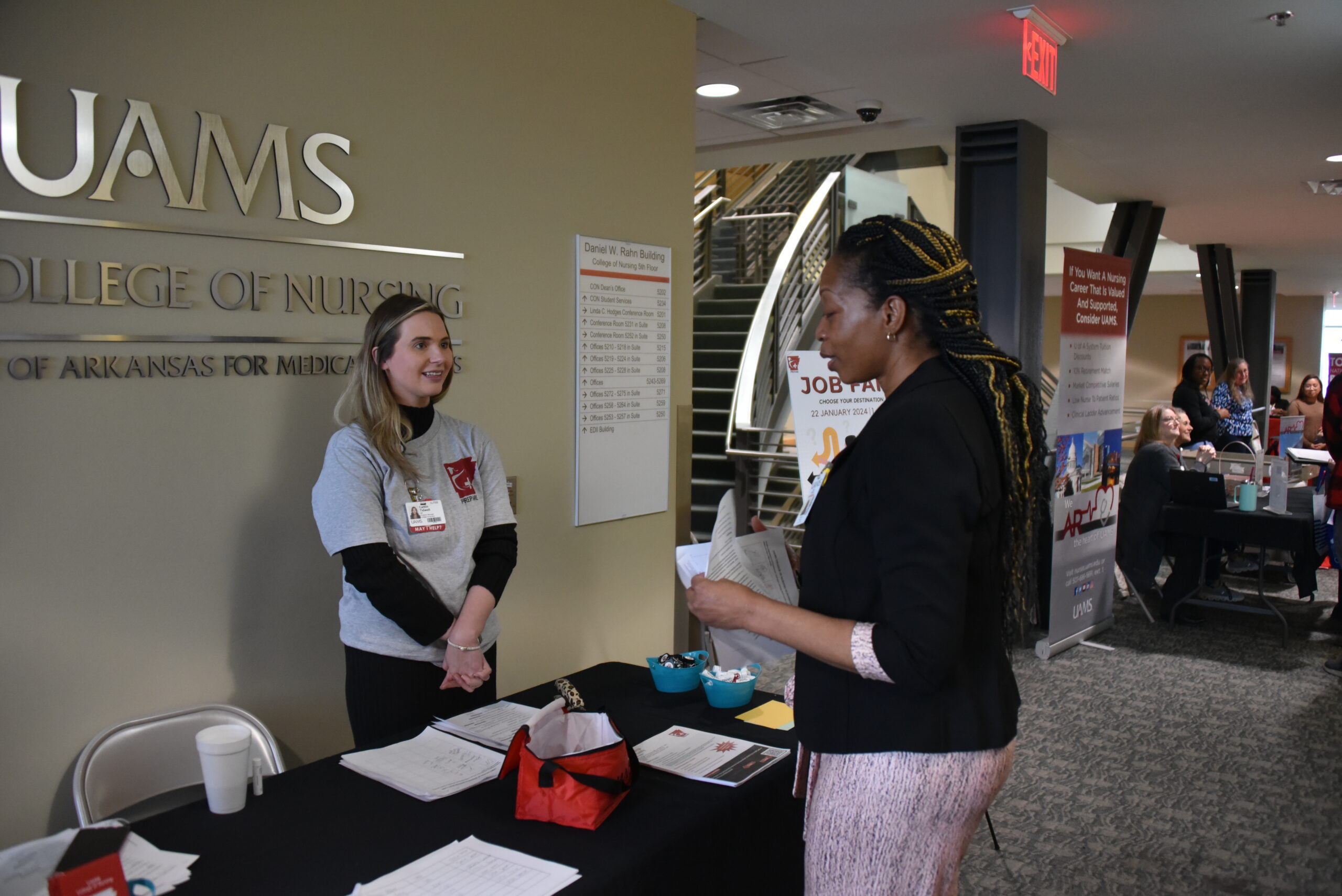2 Federal Grants Support Students in UAMS College of Nursing
| Students from two doctoral programs in the University of Arkansas for Medical Sciences (UAMS) College of Nursing are seeing the benefits from a pair of federal grants intended to prepare them for careers in rural and medically underserved communities.
The Doctor of Nursing Practice (DNP) Nurse Practitioner program last year received a four-year, $2.6 million award through the Advanced Nurse Education Workforce (ANEW) Grant. The other award, the Nurse Anesthesia Traineeship grant, provides $96,310 over four years for students in the DNP Nurse Anesthesia program.
Both grants are administered by the Health Resources and Services Administration (HRSA) of the U.S. Department of Health and Human Services.
The ANEW Grant is funding initiatives that help students meet the specific medical needs of patients in Arkansas, said Teresa Whited, DNP, APRN, associate dean of academic programs in the College of Nursing. The college is working to create more training opportunities in rural and underserved areas, as well as to provide educational components covering topics such as substance use disorders, mental health and social determinants of health.
Other efforts focus on improving the educational experience for students and preceptors. Earlier this year, the College of Nursing held a “Preceptor Bootcamp” for students, offering education and advice to help them succeed in their clinical preceptorships.
Whited said the grant also enabled the College of Nursing to award between $12,000 and $15,000 in scholarship and stipend support to 35 students during the 2023-24 academic year.
“We are very excited to be able to provide this financial assistance for students who plan to serve in primary care,” Whited said.
At a January job fair organized through the ANEW Grant, Lela Brown, RN, a student in the nurse practitioner program, talked about the importance of the new scholarships. She said the award has allowed her to remain a full-time student while providing a stable home for her 11-year-old daughter.
“This scholarship is essential and life-changing because it enables me to continue my education,” she said.
Brown praised the College of Nursing’s staff and faculty for striving to ensure their students’ well-being inside and outside the classroom.
“I needed to be surrounded by people who believed in and understood me, and that sums up the faculty and staff here at UAMS,” she said. “They’re cheerleaders, mentors, counselors and family members, equipping me with the necessary tools to be an excellent provider of medical care.”
Brown, who lives in Texarkana, said she hopes to work at a rural clinic after her graduation.
“This gives me many opportunities — and a significant responsibility — to increase health care access in rural communities and decrease health disparities,” she said.
Jericho Scott, another scholarship recipient, said the money allowed him to transition from full-time to part-time work as he continues his studies in the College of Nursing.
“The grant has been a lifeline for me, covering essential needs such as textbooks, nutritious meals and transportation,” he said. “It has alleviated financial strain and enabled me to be more focused and engaged in a demanding program.”
The classroom and clinical demands of DNP programs leave students with little time to pursue employment opportunities. Many also have difficulty qualifying for additional financial aid for advanced-degree programs, which further limits their options.
“Many students at this stage of their education say they are running on fumes financially, and a little extra money makes a big difference for them,” said Michelle Gonzalez, Ph.D., CRNA, clinical associate professor and director of the college’s DNP Nurse Anesthesia program.
The Nurse Anesthesia Traineeship grant is intended to provide some relief for students in the program. Gonzalez said the funding is primarily used to offset the cost of housing for residents who leave the Little Rock area for their clinical rotations. These rotations typically last two to four months, allowing students to gain experience in cities such as Hot Springs and Mountain View.
Gonzalez noted that 100% of the grant funding goes directly to students. After the housing disbursals, any remaining funds are used to help students pay for their certification exams.
“I can tell you from the graduating seniors’ perspective that it is definitely a welcome cash infusion after being in school for three years and having no income,” Gonzalez said. “The certification exam is the last big bill they have for school, and they can’t practice until they pass that exam.”
Michael Agbor, DNP, CRNA, adjunct clinical instructor in the College of Nursing, graduated from the nurse anesthesia program in 2023. He said that while most of his tuition expenses were covered by student loans, the cost of his certification exam was not.
“This support came at the right time to help me accomplish my dream of becoming a certified registered nurse anesthetist,” he said.
